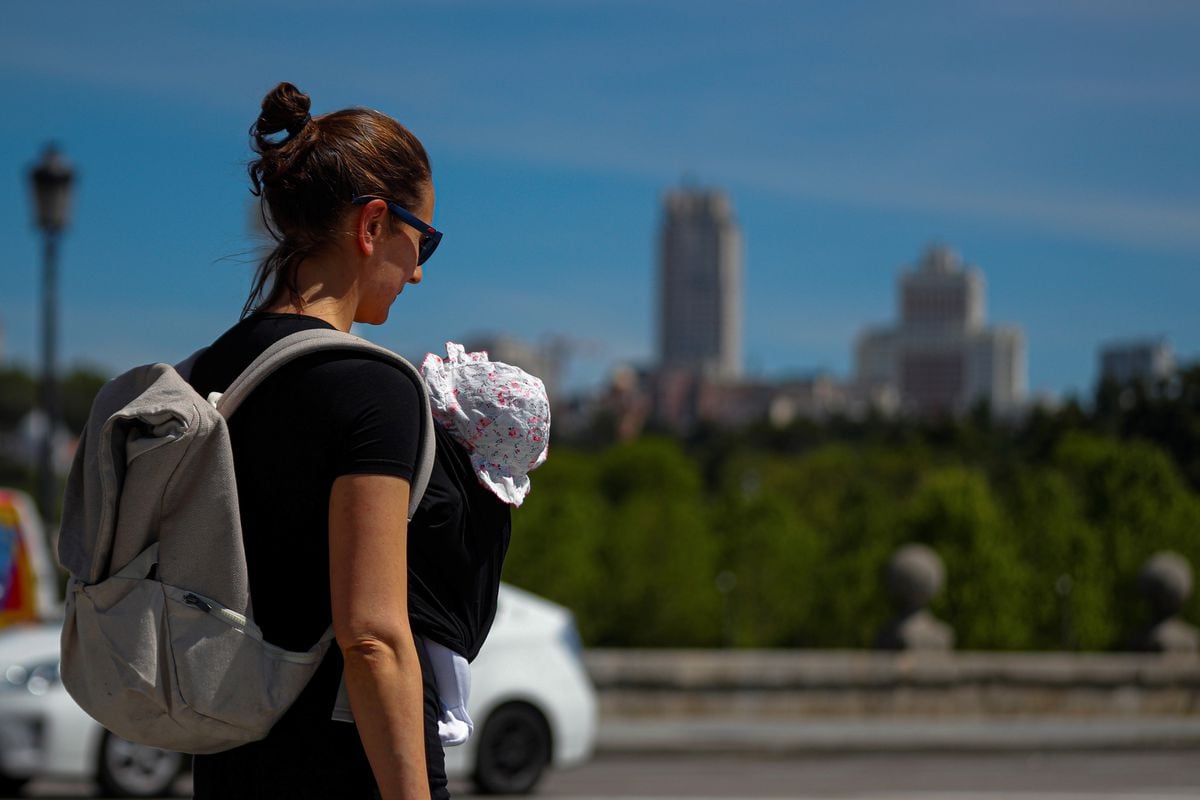Porto Alegre cemetery workers carry a coffin during the burial of a COVID-19 victim Reuters
Several Brazilian cities already register more deaths than births due to the pandemic.
Last March, the deadliest of this health crisis so far, more people died than were born in at least 12 of the 50 cities with more than 500,000 inhabitants, including Rio de Janeiro, Natal and São Bernardo do Campo .
In recent decades, the difference between births and deaths in Brazil has been gradually decreasing, but the excess of deaths during the pandemic is accelerating the meeting of these two curves, something that the Brazilian Institute of Geography and Statistics (IBGE) had projected that only would occur in more than 25 years, in 2047. The high volume of deaths worries the experts, who estimate that, if the current rates of deaths and new infections by covid-19 are maintained, in April the entire country may already reach a unprecedented mark: the record of more deaths than births in a month.
More information
The Brazil of the forgotten: no money, no food, no vaccine
Six prisoners die and 56 are hospitalized for malnutrition in a Brazilian prison
EL PAÍS has analyzed data from the most populated cities in Brazil from the Transparency Portal of the Civil Registry.
This newspaper has identified that in 24% of the municipalities the curves have already crossed.
The data includes deaths from all causes and is still preliminary.
There is an average period of ten days for deaths and births to be registered in the registry offices and for the information to be entered into the system.
But they are one more indicator of the dramatic excess of deaths caused by the pandemic, which is already impacting the demographics of Brazilian cities.
“It is unprecedented.
There have never been more deaths than births, ”says Márcia Castro, professor of demography and member of the Harvard Center for Demographic and Development Studies.
Castro says that last year it was difficult to imagine a scenario like this in Brazil, but the second wave of the pandemic associated with the absence of measures to reduce contagion has shown that it could occur soon.
"We've never seen growth [in deaths] like this," he says.
Unprecedented deficit in Rio Grande do Sul
The most emblematic situation occurs in Porto Alegre.
Last month, the capital of the State of Rio Grande do Sul registered 3,221 deaths and 1,509 births.
The demographic deficit was also registered in the rest of the State.
In total, 11,971 babies were registered and 15,802 death certificates were issued that month, 48% of which were from covid-19.
The number of deaths from covid-19 registered in March is four times higher than in February, when the disease claimed 1,943 lives.
The state of Rio Grande do Sul - the only state in the country with more deaths than births in March - saw chaos unleash in the health system, with overcrowded ICUs and collapsed hospitals in many municipalities.
Record of deaths in Uberlândia
Uberlândia, a populous city in the state of Minas Gerais, registered 262 more deaths than births last March.
If in the same month of 2019 and 2020 the city had just over 300 deaths, the figure has tripled this year, when the municipality has also reached the most serious moment of the health crisis: 1,092 deaths, 63% from covid- 19.
During the past year, Mayor Odelmo Leão - an ally of President Jair Bolsonaro - announced "early treatment" against COVID-19 and distributed hydroxychloroquine, an ineffective drug for the disease, to the population free of charge.
Several times he went to court in order to relax the measures of social isolation.
Since January, the city that governs has seen how deaths multiply.
In March, he himself admitted that the healthcare system had collapsed.
Dozens of people waited for beds in hospitals and tried to have them transferred, while 450 new cases were registered daily.
The city has already surpassed 1,900 deaths from covid-19, more than half this year.
The Brazil of the forgotten: no money, no food, no vaccine
The Senate will investigate Bolsonaro while Brazil registers more than 3,000 daily deaths from covid
Fortaleza, one of the first Brazilian capitals to feel the impacts of the coronavirus crisis last year, even managed to control infections after a difficult first wave.
But this year, the pandemic has come overwhelmingly and even the network of private hospitals has collapsed.
Last March, the city recorded 3,401 deaths from all causes and only 2,426 births - a difference of 975 records.
Given the worsening of the pandemic, the capital of the State of Ceará is taking restrictive measures, such as the closure of non-essential shops and the prohibition of parties and circulating on the beaches.
In Recife, the situation emerging from the pandemic and its impact on the demographic pyramid is also dramatic.
In March 2020, the capital of the State of Pernambuco had positive demographic growth, with 1,978 births and 1,386 deaths (a surplus of 592).
A year later, this picture has been reversed: 2,192 deaths compared to 1,978 births (a deficit of 214).
In the State, deaths from covid-19 are increasing: April 7 reached the 30th day, consecutively, of growth in the moving average of deaths.
In total, 12,541 people have already died from covid-19 in Pernambuco.
In other cities, the death and birth curves have not yet crossed, but they already present indicators that suggest they will.
This is the case, for example, of the capitals São Paulo and Florianópolis.
In March 2019, in the first there were 8,740 more births than deaths.
A year later, in 2020, this figure decreases slightly, only 6,151 more.
And in March 2021 it plummets to 459, which indicates the impact that deaths from covid-19 have had on the city, which already adds a total of 79,440 deaths.
Florianópolis, meanwhile, had 419 more births than deaths in 2019. The following year, this difference was reduced to 336 and this year, to only 144. The pandemic took longer to generate a crisis in the capital of the State of Santa Catarina on last year, but the second wave has caused queues to access ICUs and a high death rate.
In Brazil as a whole, the difference between births and deaths decreases every month.
Partly due to the reduction in fertility rates, with fewer families, but mainly due to the strong impact of deaths during the pandemic.
"It's something impressive," considers neuroscientist Miguel Nicolelis, columnist for EL PAÍS.
“Life expectancy in Brazil has decreased by two years.
We now have the first evidence that the pandemic may be causing a structural problem in the indices. "
The change in the proportion of deaths and births caused by the pandemic has also occurred in other countries.
“It is happening in various places, including in the United States.
There the surplus of births has been reduced from 800,000 to approximately 300,000 in one year, ”says Nicolelis.
The United States is the country with the highest number of COVID-19 victims in the world, with more than 559,000 deaths in total, according to data from Johns Hopkins University.
The demographic effect may be temporary
Researcher Márcia Castro believes that, in Brazil, the demographic effect that is beginning to be observed in several cities will be temporary.
As deaths from covid-19 begin to decline, the proportion will reverse again.
But the impact of excess deaths is clear, worrying, and a reflection of the lack of control.
It is expected to be temporary, but it depends on what is done to contain this high mortality, ”he says.
The IBGE predicted that the two curves would definitely intersect in Brazil in 2047. This calculation takes into account the data of a whole year and, for now, what is observed is a tendency for this crossing to occur in a month.
“For it to happen in 2021, we would have to continue this madness for some time.
I really hope it doesn't happen, because there would be a number of lives lost that you can't even imagine, ”he explains.
If the average number of daily deaths from covid-19 is maintained throughout the year, this reversal between deaths and births could have profound repercussions for Brazil.
"There will be a demographic change, a shock never seen before in the country: the reversal of the relationship between deaths and births affects the demographic bonus that Brazil has always had, which is historical," adds Nicolelis.
“If this trend is maintained for several months, there will be long-term effects, it can impact the productive mass, the workforce.
A decrease in youth leads to a decrease in the economically active population ”.
The researcher estimates an economic impact "of billions of reais" in the coming decades if this situation is consolidated.
"The cost of confinement is infinitely lower," he defends.
Subscribe here
to the
newsletter
of EL PAÍS América and receive all the informative keys of the current situation in the region





/cloudfront-eu-central-1.images.arcpublishing.com/prisa/LQPWPAKRSFAOTLDKLCXHU5HOLU.jpg)









/cloudfront-eu-central-1.images.arcpublishing.com/prisa/IGZ7GOCXZ5GUPAQ2HWGK6Z76BU.jpg)